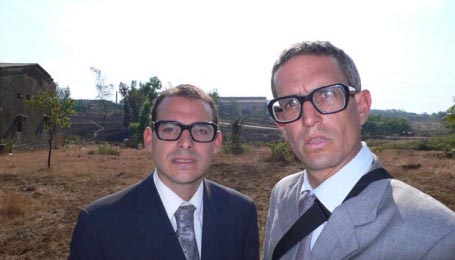-
Yes Men at Film Forum
by Stephen Squibb October 19, 2009

The Yes Men are performance artists. They are not propagandists, labor organizers, critical theorists, progressive lobbyists, politicians, orators, philanthropists, utopian industrialists, visionary editors, filmmakers (it must be said), newspaper columnists, pamphleteers, investigative reporters, international proto-revolutionary leaders, or legislators. They might be socialists but they don’t say. They are activist performance artists and they are the best we have. It does not take anything away from their commitment, their audacity, or their talent to state that this fact is cause for some concern.
The occasion for this reminder is their new movie ‘The Yes Men Fix the World’ now showing at Film Forum. It is a bad film and a delightful one. It is clumsy and stilted and altogether inspiring. It is best viewed as primary source material; evidence submitted in the ongoing case for a Newer Left, one that would perhaps provide for all the above enumerated roles leaving the Yes Men to do what they do best, which is a very wonderful thing indeed.
What they do, in the event that you are unaware, is get themselves invited to things – mostly conferences, with the occasional home-run BBC segment thrown in – by posing as representatives for reprehensible organizations. Once invited, they show up and offer some presentation designed to call attention to a particularly egregious wrong being perpetrated by that corporation (most often) or government agency (less frequently).
The process usually begins with the Men setting up a fake website, such as dowethics.com, and then responding to incoming requests for appearances. It is a conceit all the more interesting for revealing just how open and disorganized so much of corporate and media discourse really is. In the case of the Dow website, it led directly to an invitation by the BBC to address the twentieth anniversary of the Bhopal catastrophe. So it came to pass that Andy Bichlbaum, performing under some deliciously ridiculous name, alerted the world that Dow Chemical was taking full responsibility for the tragic legacy of its newly purchased subsidiary, Union Carbide, by liquidating it and paying full restitution to its victims. This news, and it was actual news for about an hour, caused the citizens of Bhopal to rejoice and Dow to lose a breathtaking two billion dollars off its stock price. If you can imagine a more spectacular demonstration of moral bankruptcy, I would love to hear it.

What is so striking, though, about seeing behind the scenes of these stunts is just how modest an operation the Men are. They are often visibly nervous and as amazed as anyone when the whole thing works. In a terribly indicative segment, about an hour after the BBC broadcast, Andy finds himself back on the phone with the network that has at last gotten a clue. Gently holding his hand over the receiver, Andy whispers to Mike Bonanno, the other Man, and presently wielding the camera: “So I guess the thing to do is just come clean at this point, right?” His face, a mixture of gleeful excitement and sheer terror, indicates the clear lack of a working strategy.
While it’s refreshing to see such guilelessness on the Men’s part, it’s also quite painful when the time comes to defend their hard-won moral high ground. The BBC hauls the men back down to the studio, grills them, and when one commentator is brazen enough to suggest that the hoax was little more than a cruel inflation of Bhoplian hopes, we wait in vain for Andy to drop the well-earned hammer. No doubt a prepared statement would have been helpful. As it is, the Men are left looking less like organized crusaders than well-meaning goofballs, which, of course, they are.
And there is nothing wrong with that, in and of itself, but as the movie wears on we become more and more frustrated by the lack of context. Who are these two? How did they come to believe what they do? Who influenced them? How do they choose their targets? Apparently disturbed by the ridiculous argument of the BBC toady, the men travel to Bhopal to make sure that nobody there, at least, is mad at them. Though they find some reassurance, little is accomplished in the way of illuminating documentary, and the whole voyage ends up feeling decidedly self-serving.
Similarly, a trip to a free market think-tank leads to nothing beyond a simplistic and oft-repeated denunciation of Milton Friedman, the worthiest of villains, to be sure, but what of the counter-narrative? This segment, in particular, with its use of cartoons and suspect edits, owes entirely too much to Michael Moore, whose hackery haunts the entire film.

Perhaps if the Men had let somebody else direct, things might have been different. Indeed, the final stunt detailed in the movie, last year’s fake Times, shows Mike and Andy at their organizational best, displaying a real aptitude for bringing numerous and disparate elements together in the service of something truly outstanding. Why not approach the movie the same way?
This year’s fake newspaper, the climate change Post, apparently happened too recently to make the final cut. And that’s okay. As it was, that piece was a pretty painful reminder of the lack of a populist progressive outrage in this country. Furthermore as a repetition of the Times idea, it seemed to beg the obvious question – why not just start a leftist tabloid? The answer, I think, goes back to what it is the Men do and don’t do, and, by extension, what the rest of us should probably get to work on.

